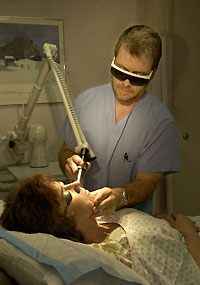For more archives, go to the Advance Archive/Search Page.
Health Center Meets Growing
Demand For Cosmetic Services
 |
With a fast and virtually painless laser treatment, dermatologist Dr. James
Whalen, removes unwated hair from the face of a patient. Dermatology was one
of the first Health Center departments to offer costmetic services.
Photo by Peter Morenus
|
The demand for cosmetic services is on the rise throughout the U.S., and the UConn Health Center is responding by offering a complete range of aesthetic services.
A growing number of Health Center faculty from several different disciplines, including plastic surgery, dermatology, ophthalmology, vascular surgery, and many facets of dentistry, provide contemporary cosmetic services.
"We offer a holistic, multidisciplinary approach, featuring the latest, science-based therapies in an environment of respect and confidentiality," says Dr. Jane Grant-Kels, chair of the department of dermatology.
Data suggest that the timing is right. The demand for cosmetic services is at an all-time high, according to the American Society of Plastic Surgeons, which reports that more than 8.7 million procedures were performed in 2003, a 32 percent increase from 2002.
Other academic medical centers are also developing the range of cosmetic services they offer. Johns Hopkins Medical Institutions, for example, opened a new center dedicated solely to cosmetic services last year. And Duke University Health System has a freestanding Center for Aesthetic Services. Both offer a similar array of services to those available at the Health Center.
The demand for cosmetic procedures is increasing despite the fact that most are not covered by insurance. "Those who really want the work done will pay for it," Squier says. "This is a major trend in health care today. Everyone wants to look as good as people they see on television."
At the Health Center, dermatology was one of the first departments to introduce a line of cosmetic services, ranging from Botox to eliminate wrinkles and laser treatments to remove unwanted hair, tattoos, or pigmented lesions, to microdermabrasion and other approaches to give facial skin a more youthful appearance. Along with Grant-Kels, dermatologists offering cosmetic services include Drs. Tanya Ave'Lallemant, Timothy Chartier, Caron Grin, Wendy Levinbook, James Whalen, and Diane Whitaker.
Other departments offering aesthetic services include ophthalmology, where Drs. Jeanine Suchecki, chair of the department, and William Ehlers offer refractive surgical procedures to correct the need for glasses in patients who are near-sighted or far-sighted. In addition, vascular surgeon Dr. Michael S. Dahn offers minimally invasive surgical procedures to treat varicose veins and other vein-related problems.
To help people obtain perfect, symmetrical, and sparkling smiles, cosmetic dental services are offered by orthodontists Drs. Ravi Nanda and Flavio Uribe, as well as prosthodontist Dr. Rachel Squier, and oral and maxillofacial surgeon Dr. David Shafer.
The arrival of reconstructive plastic surgeon Dr. Rajiv Chandawarkar in 2003 completed the Health Center's menu of cosmetic services. Chandawarkar offers comprehensive cosmetic surgical procedures, including face-lifts, brow lifts, nose reconstruction, breast lifts, breast augmentation, breast reduction, tummy tucks, liposuction, and more.
"When you consider the popularity of television shows like Extreme Makeover, it's obvious there is a strong demand for cosmetic services among healthcare consumers - male and female, young and old alike," Chandawarkar says.
However, Chandawarkar warns that the notion of an "extreme" makeover is unattainable for most people. "The show is misleading in the sense that viewers do not get a full sense of how involved the many surgical procedures are, or the cost, or the recovery time," he says. "In real life, most makeovers are less extreme but still very satisfying. One procedure can go a long way to help improve a person's sense of well being and confidence."

